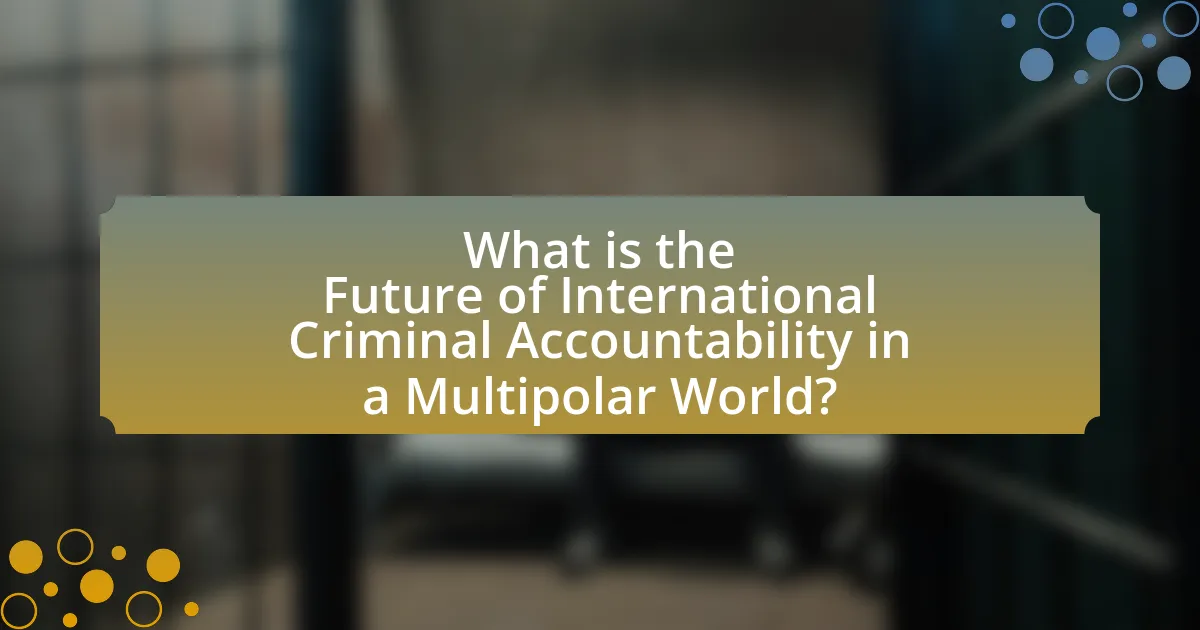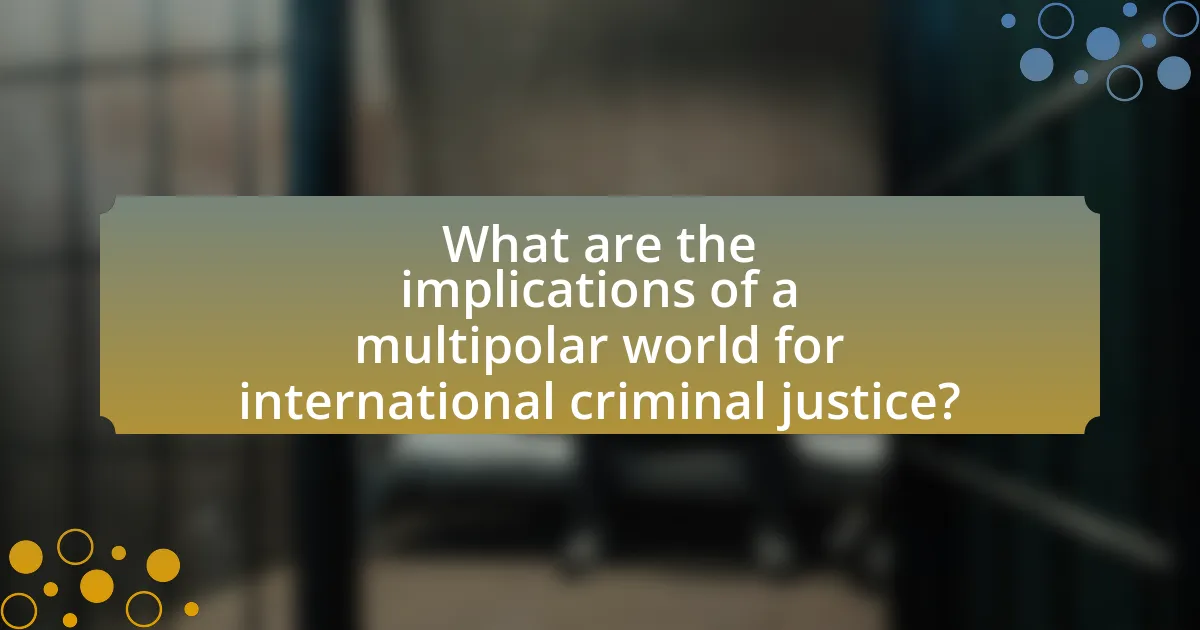The article examines the future of international criminal accountability within the context of a multipolar world, where the balance of power among nations is shifting. It highlights the challenges faced by traditional accountability mechanisms, such as the International Criminal Court (ICC), due to the resistance from powerful states and the emergence of regional powers with divergent legal standards. Key factors influencing accountability include state cooperation, political will, and the role of non-state actors. The article also discusses the implications of multipolarity on the enforcement of international law, the importance of accountability for global peace and security, and the potential for technology to enhance transparency and effectiveness in accountability processes.

What is the Future of International Criminal Accountability in a Multipolar World?
The future of international criminal accountability in a multipolar world is likely to face significant challenges due to the shifting balance of power among nations. As countries like China and Russia assert their influence, traditional mechanisms for accountability, such as the International Criminal Court (ICC), may struggle to maintain authority and effectiveness. This is evidenced by instances where powerful states have resisted cooperation with international legal frameworks, undermining the enforcement of accountability measures. Furthermore, the rise of regional powers may lead to divergent legal standards and practices, complicating global consensus on accountability. The interplay of national interests and geopolitical dynamics will shape the landscape of international criminal justice, potentially leading to a fragmented approach that prioritizes state sovereignty over universal accountability.
How does the concept of international criminal accountability evolve in a multipolar context?
The concept of international criminal accountability evolves in a multipolar context by adapting to the diverse power dynamics and interests of multiple global actors. In a multipolar world, states with varying degrees of influence, such as the United States, China, and the European Union, shape international norms and legal frameworks differently, leading to a more fragmented approach to accountability. For instance, the International Criminal Court (ICC) faces challenges in enforcing its mandates due to the lack of universal support from powerful nations, which can choose to ignore or reject its authority. This situation is evidenced by the withdrawal of some countries from the ICC’s jurisdiction and the selective prosecution of crimes based on geopolitical interests, highlighting the complexities of achieving consistent accountability. As a result, the evolution of international criminal accountability in this context requires negotiation and cooperation among diverse state actors, often resulting in a patchwork of legal standards and enforcement mechanisms.
What are the key factors influencing international criminal accountability today?
The key factors influencing international criminal accountability today include the effectiveness of international legal frameworks, the political will of states, and the role of non-state actors. The International Criminal Court (ICC) and various tribunals provide legal structures for accountability, but their effectiveness often hinges on state cooperation and enforcement. For instance, the ICC relies on member states to arrest and surrender individuals, which has been problematic in cases like Sudan’s Omar al-Bashir, who evaded arrest due to lack of cooperation from certain countries. Additionally, the political will of powerful nations can either bolster or undermine accountability efforts, as seen in the selective prosecution of war crimes based on geopolitical interests. Non-state actors, including NGOs and civil society, also play a crucial role by advocating for justice and documenting violations, thereby influencing public opinion and policy. These factors collectively shape the landscape of international criminal accountability in a multipolar world.
How does multipolarity affect the enforcement of international law?
Multipolarity complicates the enforcement of international law by creating diverse power centers that may prioritize national interests over collective legal obligations. In a multipolar world, states like the United States, China, and the European Union exert significant influence, often leading to conflicting interpretations and applications of international law. For instance, the varying responses to issues such as human rights violations or territorial disputes demonstrate how different powers may choose to ignore or selectively enforce international legal standards based on their geopolitical interests. This fragmentation can undermine the effectiveness of international legal institutions, as seen in the inconsistent application of sanctions or the varying levels of cooperation with international courts.
Why is international criminal accountability important in a multipolar world?
International criminal accountability is crucial in a multipolar world because it helps maintain global order and justice by holding states and individuals accountable for serious crimes, such as genocide and war crimes. In a multipolar system, where power is distributed among multiple nations rather than dominated by a single superpower, the risk of impunity increases as states may prioritize national interests over international norms. Historical examples, such as the Nuremberg Trials post-World War II, demonstrate that accountability mechanisms can deter future atrocities and promote adherence to international law. Furthermore, the establishment of the International Criminal Court (ICC) reflects a collective commitment to justice that transcends national boundaries, reinforcing the idea that no one is above the law, regardless of their position or power.
What role does accountability play in global peace and security?
Accountability is essential for global peace and security as it deters violations of international law and promotes justice. When states and individuals are held accountable for actions such as war crimes, genocide, and crimes against humanity, it reinforces the rule of law and discourages future transgressions. Historical examples, such as the Nuremberg Trials after World War II, demonstrate that accountability mechanisms can lead to a more stable international order by establishing consequences for egregious acts. Furthermore, the International Criminal Court (ICC) serves as a contemporary example, where its prosecutions aim to uphold accountability and contribute to long-term peace by addressing impunity.
How does accountability impact state sovereignty and international relations?
Accountability significantly impacts state sovereignty and international relations by establishing norms that govern state behavior and promote adherence to international law. When states are held accountable for actions such as human rights violations or war crimes, it can lead to a reduction in impunity and encourage compliance with international standards. For instance, the establishment of the International Criminal Court (ICC) has created a framework where leaders can be prosecuted for crimes against humanity, thereby influencing state actions and policies. This accountability mechanism can also strain relations between states, particularly when powerful nations resist international scrutiny or intervention, as seen in cases like the Syrian conflict. Thus, accountability serves as both a tool for promoting justice and a potential source of tension in international relations.
What challenges does international criminal accountability face in a multipolar world?
International criminal accountability faces significant challenges in a multipolar world due to the divergence of political interests among powerful states. In this context, countries may prioritize national sovereignty over international legal obligations, leading to reluctance in cooperating with international tribunals. For instance, nations like Russia and China often oppose Western-led initiatives, undermining the effectiveness of institutions such as the International Criminal Court (ICC). Additionally, the lack of a unified approach to enforcement mechanisms complicates the prosecution of war crimes and crimes against humanity, as seen in the ongoing conflicts in Syria and Ukraine, where geopolitical interests hinder accountability efforts. This fragmentation of power and influence creates an environment where international norms can be selectively applied, further challenging the pursuit of justice on a global scale.
How do differing national interests complicate accountability efforts?
Differing national interests complicate accountability efforts by creating divergent priorities among states, which can hinder collective action and consensus on international legal standards. For instance, countries may prioritize their geopolitical alliances or economic interests over the enforcement of international criminal law, leading to selective justice. An example is the reluctance of some nations to support the International Criminal Court’s investigations when their allies are implicated, as seen in cases involving political leaders from powerful states. This inconsistency undermines the credibility of accountability mechanisms and allows impunity to persist, as nations may refuse to cooperate with investigations that conflict with their strategic interests.
What are the limitations of current international legal frameworks?
Current international legal frameworks face significant limitations, including lack of enforcement mechanisms, jurisdictional challenges, and inconsistent application across different states. Enforcement mechanisms are often weak, as international bodies like the International Criminal Court rely on member states for cooperation, which can be politically motivated or absent altogether. Jurisdictional challenges arise when states refuse to recognize the authority of international courts, leading to impunity for perpetrators of serious crimes. Additionally, the inconsistent application of laws can result in selective justice, where certain cases are pursued while others are ignored, undermining the credibility of international law. These limitations hinder the effectiveness of international legal frameworks in holding individuals accountable for crimes in a multipolar world.
How can international criminal accountability be strengthened in a multipolar world?
International criminal accountability can be strengthened in a multipolar world by enhancing cooperation among states, establishing universal jurisdiction, and reinforcing international legal frameworks. Enhanced cooperation can be achieved through multilateral treaties that facilitate extradition and mutual legal assistance, as seen in the Hague Convention on the Law Applicable to Traffic Accidents. Establishing universal jurisdiction allows states to prosecute serious crimes regardless of where they were committed, as demonstrated by the principle applied in cases like the prosecution of former Chilean dictator Augusto Pinochet in Spain. Reinforcing international legal frameworks, such as the International Criminal Court’s Rome Statute, can provide a consistent basis for accountability, ensuring that states adhere to their obligations to prosecute or extradite individuals accused of international crimes.
What reforms are necessary for international legal institutions?
Reforms necessary for international legal institutions include enhancing the representation of diverse nations, improving the efficiency of legal processes, and increasing accountability mechanisms. Enhanced representation ensures that the voices of emerging powers and smaller nations are included in decision-making, which is crucial in a multipolar world where power dynamics are shifting. Improving efficiency can be achieved by streamlining procedures and reducing case backlogs, as evidenced by the International Criminal Court’s ongoing challenges with lengthy trials. Increasing accountability mechanisms, such as independent oversight bodies, can help restore trust in these institutions, as seen in the calls for reform following criticisms of bias and ineffectiveness in past cases.
How can cooperation among states enhance accountability mechanisms?
Cooperation among states can enhance accountability mechanisms by facilitating information sharing, joint investigations, and unified legal frameworks. When states collaborate, they can pool resources and expertise, leading to more effective enforcement of international laws. For instance, the establishment of the International Criminal Court (ICC) relies on state cooperation for arrest warrants and evidence gathering, which has proven essential in prosecuting war crimes and crimes against humanity. Additionally, regional agreements, such as the European Arrest Warrant, exemplify how states can streamline extradition processes, thereby increasing the likelihood of holding perpetrators accountable. This collaborative approach not only strengthens legal frameworks but also fosters a culture of accountability among nations, as seen in the collective responses to human rights violations in various international contexts.

What are the implications of a multipolar world for international criminal justice?
A multipolar world significantly complicates international criminal justice by introducing diverse legal standards and varying political interests among states. In this context, countries may prioritize national sovereignty over international norms, leading to inconsistent enforcement of international law. For instance, the International Criminal Court (ICC) faces challenges in prosecuting individuals from powerful nations that refuse to cooperate, as seen with the United States and its non-ratification of the Rome Statute. Additionally, the rise of regional powers can result in competing judicial mechanisms, which may undermine the universality of international justice. This fragmentation can hinder global efforts to address crimes such as genocide and war crimes, as states may selectively engage with international legal frameworks based on their geopolitical interests.
How does the rise of new powers influence international criminal tribunals?
The rise of new powers influences international criminal tribunals by altering the geopolitical landscape and impacting the enforcement of international law. As emerging nations gain economic and political clout, they often challenge the existing power dynamics that shape the operations of these tribunals. For instance, countries like China and India, which have historically been skeptical of Western-led initiatives, may resist cooperating with tribunals perceived as biased or politically motivated. This shift can lead to decreased participation in international legal frameworks and undermine the tribunals’ authority. Additionally, the growing influence of these powers can result in a push for reforms within the tribunals to better reflect a multipolar world, as seen in discussions around the International Criminal Court’s jurisdiction and its perceived legitimacy among non-Western states.
What changes can be expected in the composition of international courts?
Changes in the composition of international courts are expected to reflect a more diverse representation of member states, influenced by the shifting dynamics of global power. As emerging economies and non-Western nations gain prominence, their increased participation in international legal frameworks will likely lead to a broader range of perspectives and legal traditions being represented. For instance, the International Criminal Court (ICC) has seen calls for reforms to enhance inclusivity, particularly from African and Asian states, which argue for greater representation in judicial appointments and decision-making processes. This shift is supported by the growing recognition that a multipolar world necessitates a legal system that is more reflective of global diversity, ensuring that international justice is perceived as legitimate and equitable across different cultural and political contexts.
How might new powers reshape the priorities of international justice?
New powers may reshape the priorities of international justice by shifting focus from traditional Western-centric frameworks to a more multipolar approach that reflects diverse geopolitical interests. As emerging powers like China and India gain influence, they may advocate for justice priorities that align with their national interests and perspectives, potentially prioritizing state sovereignty and non-interference over human rights interventions. This shift is evidenced by China’s increasing role in international organizations and its promotion of the concept of “sovereign equality,” which challenges the existing norms established by Western powers. Consequently, the evolving landscape may lead to a redefinition of accountability mechanisms, emphasizing negotiation and diplomacy over punitive measures, thereby altering the effectiveness and reach of international justice systems.
What role do non-state actors play in international criminal accountability?
Non-state actors play a crucial role in international criminal accountability by influencing legal frameworks, advocating for justice, and providing resources for investigations. These entities, which include non-governmental organizations (NGOs), civil society groups, and international organizations, often fill gaps left by state actors, particularly in regions where governmental structures are weak or corrupt. For instance, NGOs like Human Rights Watch and Amnesty International document human rights abuses and push for accountability through advocacy and public awareness campaigns. Their reports can lead to international pressure on states to act against perpetrators of crimes such as genocide or war crimes. Additionally, non-state actors can assist in gathering evidence and testimonies, which are essential for prosecuting international crimes in courts like the International Criminal Court. Their involvement has been pivotal in cases such as the prosecution of war crimes in the former Yugoslavia, where organizations played a significant role in documenting atrocities and supporting victims.
How can NGOs and civil society contribute to accountability efforts?
NGOs and civil society can significantly contribute to accountability efforts by advocating for transparency, monitoring human rights violations, and mobilizing public opinion. These organizations often gather and disseminate information about abuses, which can pressure governments and institutions to act. For instance, Human Rights Watch and Amnesty International have documented violations and lobbied for accountability measures, influencing international legal frameworks. Additionally, civil society groups can engage in legal advocacy, providing evidence and support for cases in international courts, thereby reinforcing the rule of law. Their grassroots connections enable them to raise awareness and foster community engagement, which is crucial for sustaining accountability initiatives.
What challenges do non-state actors face in influencing international law?
Non-state actors face significant challenges in influencing international law, primarily due to their lack of formal recognition and authority within the international legal framework. Unlike states, non-state actors, such as NGOs and multinational corporations, do not possess sovereign power, which limits their ability to directly participate in treaty negotiations or enforcement mechanisms. Additionally, the diverse interests and agendas of non-state actors can lead to fragmentation and competition, making it difficult to present a unified voice on legal issues.
Furthermore, non-state actors often encounter resistance from state actors who may perceive their influence as a threat to national sovereignty or existing power structures. For instance, the 2016 Paris Agreement on climate change highlighted how non-state actors, including cities and businesses, sought to influence global climate governance, yet faced pushback from certain governments prioritizing national interests over collective action. This dynamic illustrates the complex interplay between non-state actors and state sovereignty in shaping international law.

What are the future prospects for international criminal accountability?
The future prospects for international criminal accountability are increasingly complex due to the rise of a multipolar world, which challenges the dominance of traditional international legal frameworks. As nations like China and Russia assert their influence, the effectiveness of institutions such as the International Criminal Court (ICC) may be undermined, as evidenced by their non-cooperation with ICC mandates. Furthermore, geopolitical tensions can hinder collective action against war crimes and human rights violations, as seen in recent conflicts where powerful states prioritize national interests over accountability. This evolving landscape necessitates innovative approaches to ensure that international criminal accountability remains relevant and effective in addressing global injustices.
How can technology impact the future of international criminal accountability?
Technology can significantly enhance international criminal accountability by improving evidence collection, facilitating communication, and enabling real-time monitoring of human rights violations. Advanced tools such as artificial intelligence and blockchain can streamline the documentation of crimes, ensuring that evidence is tamper-proof and easily accessible for legal proceedings. For instance, AI algorithms can analyze vast amounts of data from social media and satellite imagery to identify patterns of abuse, while blockchain can provide an immutable record of evidence. These technological advancements not only increase the efficiency of investigations but also bolster the credibility of the evidence presented in international courts, thereby strengthening the overall accountability framework.
What role does digital evidence play in prosecuting international crimes?
Digital evidence plays a crucial role in prosecuting international crimes by providing verifiable information that can substantiate claims of criminal activity. This type of evidence includes data from social media, emails, satellite imagery, and other digital communications that can establish timelines, locations, and the involvement of individuals in crimes. For instance, the International Criminal Court has utilized digital evidence in cases such as the prosecution of war crimes in Libya, where social media posts were analyzed to corroborate witness testimonies. The ability to collect and analyze digital evidence enhances the transparency and reliability of investigations, making it a vital component in the pursuit of justice for international crimes.
How can technology facilitate greater transparency in accountability processes?
Technology can facilitate greater transparency in accountability processes by enabling real-time data sharing and enhancing communication among stakeholders. For instance, blockchain technology provides an immutable ledger that records transactions and actions, ensuring that all activities related to accountability are traceable and verifiable. This transparency reduces opportunities for corruption and manipulation, as evidenced by the use of blockchain in supply chain management, where companies like IBM and Walmart have successfully implemented it to track product origins and ensure compliance with ethical standards. Additionally, digital platforms can streamline reporting mechanisms, allowing victims and witnesses to submit evidence securely and anonymously, thus fostering a more open environment for accountability.
What best practices can be adopted to enhance accountability in a multipolar world?
To enhance accountability in a multipolar world, establishing robust international legal frameworks is essential. These frameworks should include clear definitions of accountability standards and mechanisms for enforcement, such as the International Criminal Court (ICC), which has been instrumental in prosecuting war crimes and crimes against humanity since its establishment in 2002. Additionally, fostering collaboration among nations through treaties and agreements can facilitate information sharing and joint investigations, as seen in the European Union’s efforts to combat transnational crime. Implementing transparency measures, such as public reporting on state actions and decisions, can also promote accountability by allowing civil society and international organizations to monitor compliance. These practices collectively strengthen the global commitment to accountability, ensuring that states and individuals are held responsible for their actions in a complex international landscape.
How can states collaborate to share best practices in accountability?
States can collaborate to share best practices in accountability through the establishment of international forums and networks that facilitate dialogue and knowledge exchange. For instance, initiatives like the International Criminal Court’s Assembly of States Parties provide a platform for member states to discuss accountability measures and share successful strategies. Additionally, bilateral and multilateral agreements can be formed to promote joint training programs and workshops focused on accountability practices, enhancing the capacity of states to implement effective accountability mechanisms. Evidence of such collaboration can be seen in the Global Accountability Network, which connects various stakeholders to share insights and experiences in accountability, thereby fostering a culture of transparency and responsibility among nations.
What lessons can be learned from past international accountability efforts?
Past international accountability efforts demonstrate the importance of establishing clear legal frameworks and the necessity of political will among states to enforce accountability. Historical instances, such as the Nuremberg Trials and the International Criminal Tribunal for the former Yugoslavia, highlight that successful accountability requires not only robust legal mechanisms but also the cooperation of nations to apprehend and prosecute offenders. Furthermore, these efforts reveal that accountability mechanisms must be adaptable to the geopolitical landscape, as seen in the varying degrees of success in different contexts, such as the challenges faced by the International Criminal Court in securing state cooperation. These lessons underscore the need for a multipolar approach that fosters collaboration among diverse international actors to enhance the effectiveness of accountability measures.


